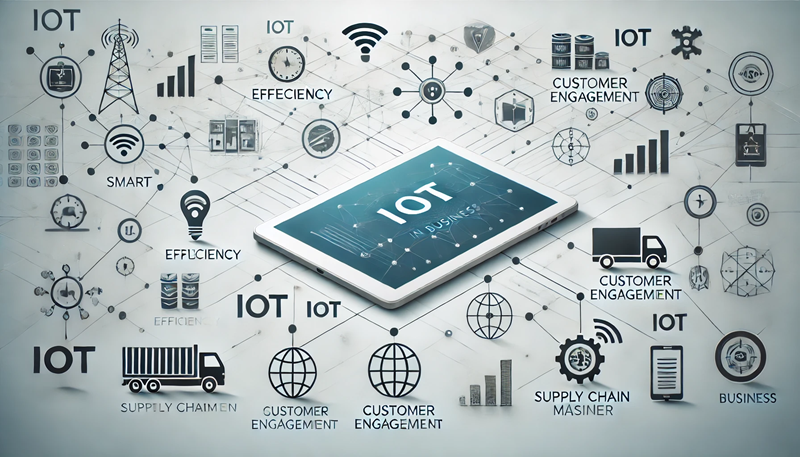The Internet of Things (IoT) has emerged as a transformative technology that connects devices, gathers real-time data, and streamlines operations. For businesses, IoT offers an unprecedented opportunity to enhance efficiency, improve customer experiences, and drive innovation. This blog explores five impactful ways IoT can help businesses thrive in today’s competitive landscape.
1. Boosting Operational Efficiency with IoT Solutions
One of the most significant benefits of IoT is its ability to optimize operations. By integrating IoT-enabled devices and sensors, businesses can monitor processes in real time and identify inefficiencies.
How IoT Enhances Efficiency
IoT devices collect and transmit data on machinery performance, inventory levels, and energy consumption. For instance, manufacturing plants use IoT to predict equipment failures, enabling preventive maintenance and reducing downtime. Similarly, IoT in logistics tracks fleet movements and ensures timely deliveries.
Business Example
Amazon leverages IoT in its warehouses to manage inventory with robotic systems and automated tracking. This seamless integration reduces errors and accelerates order fulfillment.
2. Enhancing Customer Experience Through IoT Applications
IoT technology enables businesses to deliver personalized and responsive customer experiences, helping build stronger relationships and brand loyalty.
IoT Use Cases for Customer Engagement
Smart devices provide insights into customer behavior, preferences, and usage patterns. Retailers use IoT sensors to offer personalized shopping experiences, such as smart shelves that suggest products based on customer profiles. In the hospitality industry, IoT-powered rooms allow guests to control lighting, temperature, and entertainment through their smartphones.
Impact on Business Growth
By enhancing customer satisfaction, IoT increases retention rates and drives sales. Companies that adopt IoT to improve customer interactions gain a competitive edge in the market.
3. Improving Inventory Management and Supply Chain Optimization
For businesses involved in manufacturing, retail, or logistics, IoT plays a crucial role in streamlining inventory and supply chain operations.
IoT in Supply Chains
IoT sensors track goods in transit, monitor storage conditions, and ensure products reach their destination in optimal condition. By providing real-time visibility, IoT reduces inventory wastage and improves demand forecasting.
Real-World Application
Walmart employs IoT in its supply chain to maintain inventory accuracy and ensure shelves are stocked efficiently. RFID tags and IoT trackers provide continuous updates, minimizing delays and enhancing customer satisfaction.
4. Enabling Predictive Maintenance and Cost Savings
IoT devices equipped with sensors can detect anomalies in equipment performance, enabling businesses to implement predictive maintenance strategies.
Benefits of Predictive Maintenance
By identifying potential issues before they become critical, businesses can reduce repair costs, minimize downtime, and extend the lifespan of machinery. IoT-powered predictive maintenance is widely used in industries such as manufacturing, aviation, and energy.
Case Study
General Electric (GE) uses IoT analytics in its Predix platform to monitor industrial equipment and predict failures. This approach has saved millions of dollars in maintenance costs and improved operational reliability.
5. Driving Innovation and New Revenue Streams
IoT opens the door to innovative business models and revenue streams, enabling companies to offer value-added services and products.
IoT-Driven Business Innovations
- Subscription Models: Companies can offer subscription-based services for IoT-enabled devices, such as smart home security systems.
- Data Monetization: Businesses collect and analyze IoT data to gain insights, which can be sold or leveraged for product development.
- Smart Products: IoT allows for the creation of connected products, such as wearable fitness devices or smart appliances, enhancing consumer convenience.
Example
Tesla integrates IoT into its electric vehicles, providing real-time updates, remote diagnostics, and self-driving capabilities. These features have set Tesla apart in the automotive market, driving customer loyalty and revenue growth.
The Challenges of IoT Adoption in Business
While IoT offers numerous benefits, businesses may face challenges during implementation, including:
- Data Security Risks: Protecting sensitive IoT data from cyber threats is crucial.
- Integration Complexities: Ensuring compatibility between IoT devices and existing systems can be challenging.
- Initial Costs: IoT adoption often requires significant upfront investment in infrastructure and technology.
Overcoming these challenges requires a strategic approach, including robust security measures, choosing scalable IoT platforms, and focusing on long-term ROI.
Conclusion: Embracing IoT for Business Growth
The Internet of Things is revolutionizing how businesses operate, offering a wealth of opportunities to improve efficiency, enhance customer experiences, and unlock innovation. From predictive maintenance to personalized services, IoT empowers businesses to stay competitive in a rapidly evolving digital landscape.
For companies looking to leverage IoT, the key lies in developing a clear strategy, selecting the right technology partners, and continuously innovating. As IoT adoption grows, its impact on business operations and growth will only become more profound, making it an essential tool for success in the modern era.
